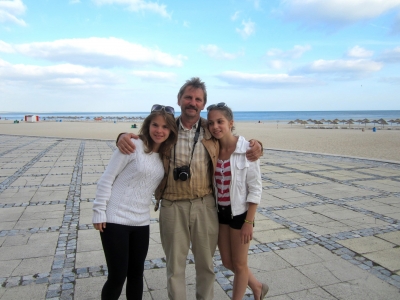02Introduction
We asked the master craftsman
Ferenc Papfalvy, the only harp manufacturer in Hungary tells us about the beginnings, about intuítion, trust, and his relationship with the clients, in his home on a mountain of Budapest
Coming to their home, Ferenc offers me a seat on their terrace in order for us to talk about his life, his company, and the world of harp making. In his words, this is much more exciting than a biography, and it is in this way—by talking personally—that we can really get to know him and his way of thinking.
• Tell us when and how you first encountered the harp, how you came to the idea to do this as a profession.
• It all began with my starting to play the flute when I was at university, and it was more and more often me who restored my own instruments, and later those of others too. I had several ideas, I would have liked to become an instrument specialist but I was not received among them. Then I got acquainted with Tünde Kiss by way of Mozart’s Flute and Harp Concerto, who was a young harp teacher back then. More than 20 years passed—during this period, I worked as a teacher, as an engineer, I built my house, and started employing wood; then an acquaintance of mine came to me with the request that a small type harp should be built from its very elements. This was strung and tuned with the help of Tünde Kiss, then I had a bold statement, according to which: ‘such a one I can make any time.’ Ms Kiss trusted me and sent those interested to me. Meanwhile, being a mechanical engineer, my interest was also aroused by the technical parts of a pedal harp. At this time I eventually saw it altogether clearly that this was the sphere of tasks that perfectly fits my personality, and gradually, I became known among the country’s harpists, too.
• This is a really special story about a blend of coincidences and dreams. You have said that you became more and more known in the arts world. What kind of reception did you encounter among harpists at the very beginning of your work?
• Everyone came to see my small type harps with great pleasure, which then got better and better tonally as well as technically, and the experience of harp artists was that there was hardly any problem which this guy stepping out of being unknown could not cope with. They could attest that pedal harp restorations of an ever greater scale and newer and newer types were handcrafted by me, which might even be of a better quality than manufactured ones.
• I guess everybody was excited that at last, Hungary also had its own harps. You mentioned your small type harps being better and better. What is the reason for this continual development?
• You know, if you focus hard on a problem with some experience on hand, then intuition, as a cognitional and creative source, works. If practice of many years is added, then you are able, owning this source, to vary hence existing forms and vary them according to the arising needs in a careful way. The other rationale is that I always consider criticism, the opinion of experienced instrument specialists, and particular decisions are preceded by a long time of thinking, evaluation. Besides this, I believe the choice of materials to be very important for I work with the best possible resources, which come principally from Transylvania, Italy, Germany, and Finland, but I have wood blocks from Siberia too. Also, chance clearly contributes to success.
• In fact, every great discovery was preceded by knowledge, much work, and some kind of lucky coincidence. If I am right in recalling what you said, more and more people use Papfalvy harps. How do your customers find you; what is your marketing strategy?
• ‘Good wine needs no bush,’ Ferenc smiles. He then continues more seriously: ‘Clients are sent to me by harp teachers in the first place, whether it is for renting or a purchase. And taking into consideration that not usual premiums are given by me, therefore I think that they do this with conviction. Besides, many requests come in also through the internet, naturally; what is more, the repute of my instruments are many a time passed along by harpists among themselves.’
• We have spoken about the Hungarian harpist world. What about artists from abroad? Do you have customers from among them too?
• Of course. At some places, I am known by way of various exhibitions, at others, through Hungarian harpists living abroad, but besides Austria and France, I also have instruments in Portugal, Britain, Romania, Slovakia, the Ukraine, and Russia.
• When I entered your workshop, I got a friendly, open reception. Do you receive every visitor in this way?
• When they come to me, they usually find me at work. The relationship being direct is also shown by the fact that many of my new models are named after the first customer. Exceptions are my models Bori, Blanka, Janka, and Sára, the ones primarily intended for lending, which I named after my daughters.
• I suppose many visitors ask how much a harp would cost and, if it is no secret, I also would like to ask this question.
• I seek to adjust my prices to Hungarian wallets; you get a 10% discount straight from the prices in Euro in Hungary. Besides this, for those who have already made many clients turn to me, I even grant them a much greater discount. Usually, I produce or restore harps for so much that it yields an acceptable hourly wage and covers the company’s costs but I do not strive for extra profit.
• This is notably extraordinary and exemplary in today’s world. Before we would say goodbye, I would like to ask what your plans, your goals in relation to the future of Hárfamíves Bt. are.
• Team building is in progress along with developments of a kind so as to make it possible for me to never let harpists down; but let every further innovation be kept as the stage secret of the company.

